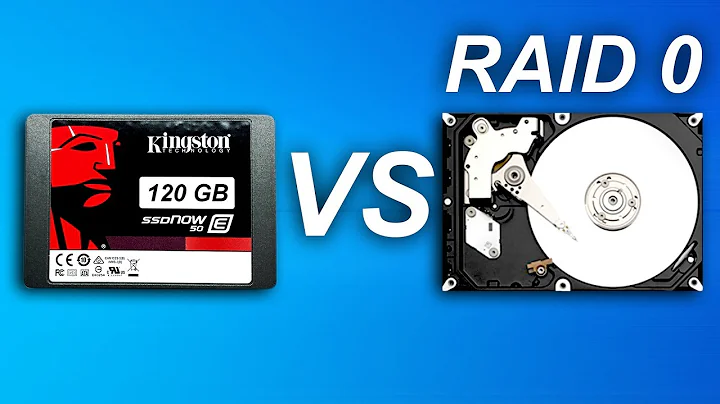One SSD + two HDD in RAID 1: SSD performance hit?
Solution 1
short answer:
If you wrote a lot to the SSD (esp. small files) after changing the BIOS: Yes
Long answer:
SSD are build with NAND chips with a page size which is quite a bit larger than the exposed 512byte sectors. The controller on the SSD word around this via internal mapping. If this mapping gets complex or dirtied then the SSD becomes a lot slower.
Or simplified, think of it as a book. the computer uses group of 512 words (lets call these paragraphs). The SSD can only write whole pages. (with multiple paragraphs on them).
If you change one paragraph then the SSD has two options:
- Read the whole page. (fast)
Change in paragraph in the remembered page (fast)
Erase the old page (very slow)
Write the changed page back. - Read the whole page. (fast)
Change in paragraph in the remembered page (fast)
Write the changed page back to some empty page (skipping the slow erasing) and change the page numbers
To keep speed high SSDs use the second option, but eventually they will run out of empty pages and then they need to fall back to the first (slow) option.
There are ways to avoid this slow down.
- If the SSD is idle (no reads or writes), then it can consolidate pages. Think of it as taking a few mostly empty pages and writing all data to a single other page. Afterwards it deleted the pages which where mostly empty. Now it has free blocks again.
- If the file system supports TRIM then deleting a file can trigger extra command to the SSD. Basically the SSD gets told 'this file is changed. I will never use it again. You may erase it if you wish, or just mark it as unused so you can consolidate pages later.
For this to work the SSD needs to support TRIM (most if not all do) and the driver and FS need to support it. As of 2012 almost no RAID configurations support this.
Conclusion: Since you enabled RAID you probably disabled TRIM.
Disclaimer: A lot depends on your write behaviour. No TRIM and lots of small writes in a short period will [significantly] lower performance on most SSDs. On the other hand a mostly empty SSD with few writes might not have a noticeable effect.
Solution 2
Use a benchmark tool on the drives and see what the performance is like. http://lifehacker.com/5824265/diskmark-is-a-free-and-easy-hard-drive-benchmark-tool
That should tell you the read speeds, and help you see if there are any problems.
Related videos on Youtube
Dinaiz
Updated on September 18, 2022Comments
-
Dinaiz over 1 year
My SSD based system is starting to feel slow and sluggish, but it used to be lightning fast. I tried to cleanup as much as I could, removed programs from startup, etc.
However, one big change I did is that I changed my HDD setup from 1 HDD to 2 HDDs in RAID 1 (for added security without having to bother with manual backups).
All my programs are on the SSD, as well as the user directory, but data is on the HDD except some things I wanted to keep really fast (mainly, my C++ programming stuff) . The weird thing is that the system can feel slower, even with SSD-only operations (launching programs, etc.).
Hardware:
- Motherboard: P6T-SE with ICH10R intel controller.
- SSD: Crucial 128 M4
- HDDs: 2 * Seagate Barracuda 7200.11 (ST31000333AS)
In order to use RAID 1, I had to change a setting in the BIOS from AHCI to RAID. Is it possible that this hurts the performance of my SSD?
I noticed in Process Explorer that one of the most time consuming processes is MsMpEng (Anti Malware Service, part of Microsoft Security Essentials).
-
Scott Chamberlain almost 12 yearsTangential to your question (but you you brought this topic up in your question) RAID IS NOT A BACKUP SOLUTION. If you accidentally delete (not move to the recycle bin) a important file how does RAID 1 protect you from that? If you get a virus how does RAID 1 get you known good copies of your files? Raid is for reducing downtime due to hardware failure or increasing I/O throughput, not "backups".
-
Dinaiz almost 12 yearsI totally agree with you. My raid is here in case one HDD physically stops working. I have a regular backup for the rest.
-
Dinaiz almost 12 yearsThat's the most interesting post I read about internals of SSD in my life ! The lack of TRIM explains this sudden performance drop. Now what would you suggest ? Do you think I should get back to AHCI and then, a software RAID 1 would work to avoid the occasional hardware crash ? Any advice on what software to use for that ?
-
Dinaiz almost 12 yearsYou're absolutely right, but to be sure, I would have to undo the raid config, switch to AHCI and benchmark again. Before going into all that hassle, I wanted to know the theory at least.
-
ganesh almost 12 yearsThat are two issues. 1) a) I would always go for normal software RAID without BIOS support. Simply because you can always get it to work on another system. b) Intel fake RAID is also software RAID, but you might NOT get it to work on another motherboard. If you do daily backups this should not matter, but most people (me included) are a bit more lax. C) Hardware RAID. A good choice, but expensive. And if the RAID card dies you end up waiting for the replacement. 2) a) Some manufacturers supply a tool to re-optimise the drive. b) Manual clean: You can tell the SSD that it is completely empty.
-
Dinaiz about 11 yearsOk, actually Intel Software Raid really hurt the perf so I used Windows 7 Software Raid 1 and it works like a charm




